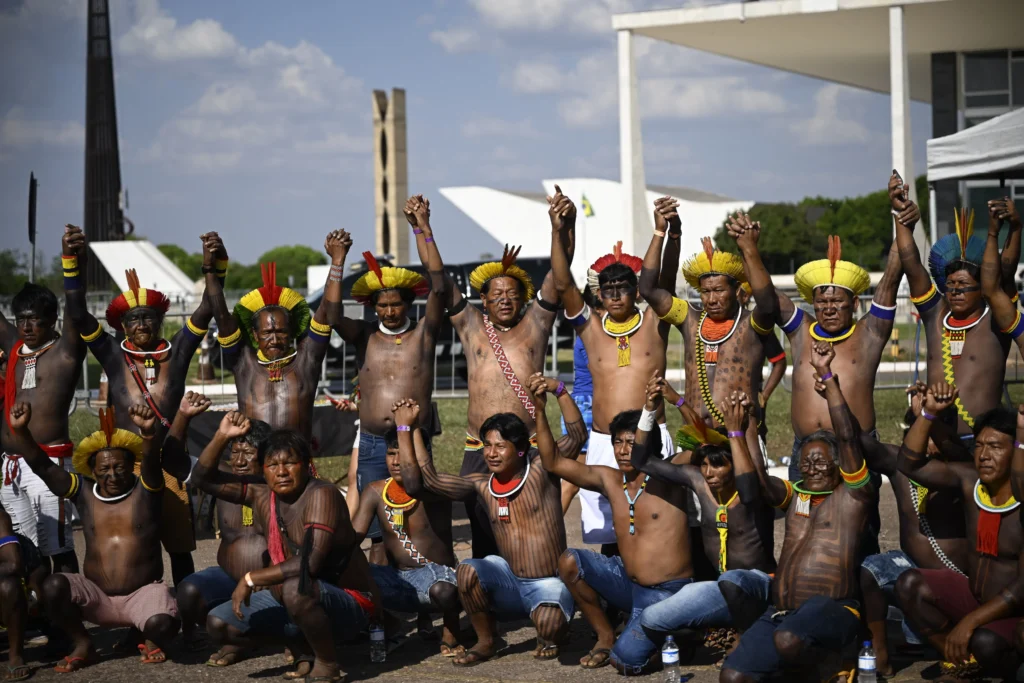Brazil’s Supreme Court Upholds Indigenous Rights to Reclaim Land
INDIGENOUS RIGHTS, 9 Oct 2023
Lyric Aquino | Grist - TRANSCEND Media Service
The ruling puts up additional road blocks for the mining, logging, and cattle industries.
25 Sep 2023 – The justices of Brazil’s Supreme Court voted 9-2 last week against a legal framework that would have made it impossible for Indigenous tribal leaders to reclaim traditional land and that would have eased the way for more mining, agriculture, and other extractive industries on that land.
The ruling sets a precedent for hundreds of acres of Indigenous land claims and is expected to have a widespread impact on Indigenous land rights.
The legal thesis at the heart of the case, known as marco temporal, had been moving through the courts since 2007 and was overwhelmingly endorsed in the nation’s conservative-dominated lower congressional house.
It involved a legal interpretation of Brazil’s 1988 constitution, which gives Indigenous peoples the right to claim lands they “traditionally occupied.” Since the adoption of the constitution in 1988, more than 700 Indigenous territories have been claimed. To date, 496 have been officially recognized, or demarcated, by the government, which defines property boundaries and guarantees the possession of the land and the exclusive use of its natural resources to the Indigenous peoples who live on it.
The theory would have limited tribal claims to territories they were occupying or legally disputing on the day the constitution was ratified. However, due to the Indian Statute of 1973, Brazil gave Indigenous peoples the same legal status as children, meaning they didn’t have standing to represent themselves in the state’s legal system — including in land matters.
The ruling marks the end of the yearslong fight that grew intensely under former President Jair Bolsonaro. Over the last four years, deforestation in the Amazon rose 56 percent with an estimated 13,000 square miles of land destroyed by development. During that time, Indigenous peoples lost an estimated 965 square miles of their traditional territories due to Bolsonaro’s policies.
Brazil’s right wing, agribusiness sector, and industries such as logging, mining, and farming with business interests in Indigenous lands, including the Amazon, have supported the effort. Many proponents cited economic development as a key reason to support the idea — particularly for soybean production, cattle farming, and mining.
President Luiz Inácio Lula da Silva took office in January and pledged to protect existing lands and create new territories. In recent months he has made climate and the environment central to his agenda. In August, his administration unveiled infrastructure investment programs and other initiatives that he pitched to start Brazil’s green transition.
________________________________________________
Lyric Aquino is an Indigenous Affairs Fellow.
Tags: Amazonia, Brasil, Brazil, History, Indigenous, Indigenous Culture, Indigenous Rights, Lula da Silva, Native South Americans, Índios
DISCLAIMER: The statements, views and opinions expressed in pieces republished here are solely those of the authors and do not necessarily represent those of TMS. In accordance with title 17 U.S.C. section 107, this material is distributed without profit to those who have expressed a prior interest in receiving the included information for research and educational purposes. TMS has no affiliation whatsoever with the originator of this article nor is TMS endorsed or sponsored by the originator. “GO TO ORIGINAL” links are provided as a convenience to our readers and allow for verification of authenticity. However, as originating pages are often updated by their originating host sites, the versions posted may not match the versions our readers view when clicking the “GO TO ORIGINAL” links. This site contains copyrighted material the use of which has not always been specifically authorized by the copyright owner. We are making such material available in our efforts to advance understanding of environmental, political, human rights, economic, democracy, scientific, and social justice issues, etc. We believe this constitutes a ‘fair use’ of any such copyrighted material as provided for in section 107 of the US Copyright Law. In accordance with Title 17 U.S.C. Section 107, the material on this site is distributed without profit to those who have expressed a prior interest in receiving the included information for research and educational purposes. For more information go to: http://www.law.cornell.edu/uscode/17/107.shtml. If you wish to use copyrighted material from this site for purposes of your own that go beyond ‘fair use’, you must obtain permission from the copyright owner.

Poka Laenui says:
ILO Convention 169 of 1989 came about which seems to track the thinking of this court case which started winding its way through the Brazilian legal system in about the same time. At Article 14 we find:
1. The rights of ownership and possession of the peoples concerned over the lands which they traditionally occupy shall be recognised.
To what extent did the development at the ILO influence the eventual recent decision of this case, I don’t know? But as the “indigenous expert” to the drafting of the ILO Convention and having taken a hand in coining the concept of “traditionally occupied” territories of the earth for indigenous peoples, I take special pride in seeing how we were in lock-step with this development in Brazil’s legal system.
ILO Convention 169 has many more concepts of indigenous peoples’ rights, not only in terms of land relationships, but in many other aspects of indigenous peoples’ lives.
Thank you for this report.
Poka Laenui (Hayden F. Burgess)
Indigenous expert to ILO convention 169